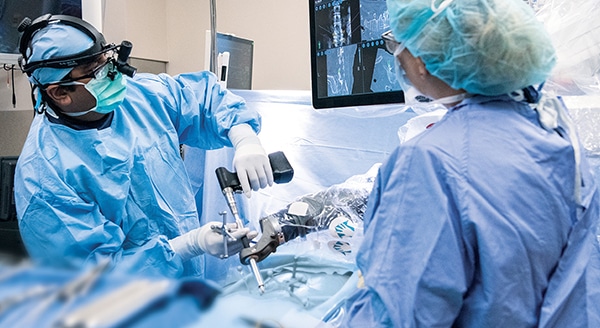
Neurosurgery
Our neurosurgeons diagnose and treat a wide range of disorders and diseases of the neurosystem, including stroke and tumors of the brain and spinal cord. Our Neuroscience Services team provides expert treatment at The Medical Center at Bowling Green to allow patients to stay right here, close to home.
Advanced CARE FOR THE BRAIN AND NERVOUS SYSTEM
At Med Center Health, we take a comprehensive team approach when it comes to neurosurgery. Our multidisciplinary team includes board-certified neurosurgeons, vascular surgeons, radiation oncologists, radiologists, and psychiatrists. Our doctors, nurses, technologists and therapists provide quality, evidence-based care. This includes using state-of-the-art technologies such as advanced image guidance navigation for brain and spine surgery.
Other advanced treatments include the Kiva VCF Treatment System, an implant-based approach to vertebral augmentation; XLIF, a minimally invasive spinal surgery procedure performed through the side of the body; and stereotactic radiosurgery, which uses many precisely-focused radiation beams to treat tumors and other problems in the brain, neck and other parts of the body.
First in state to offer ExcelsiusGPS® robotic-assisted surgery
The Medical Center at Bowling Green is the first hospital in Kentucky to offer robotic-assisted spinal surgery with ExcelsiusGPS®. This minimally-invasive approach is designed to improve safety and accuracy within the operating room.
ExcelsiusGPS offers an improved view of patient anatomy throughout the surgery to help provide the best patient treatment. Because the surgery is minimally-invasive and more accurate, patients often experience less time in the operating room, shorter hospital stays, less pain and faster recovery than with traditional surgeries.
ExcelsiusGPS is designed to improve accuracy and optimize patient care by using robotics and navigation. On the day of surgery, medical images are taken and imported into ExcelsiusGPS. The surgeon uses these images to determine the size and placement of implants and creates a patient plan based on the patient’s anatomy. This is used to guide the rigid robotic arm to a specific region of the spine, similar to a planned route or pathway on a car’s GPS. The surgeon uses this to accurately place the implants. Throughout the procedure, surgical instruments and implants are continuously displayed on a screen for the surgeon and staff to monitor. This display allows the surgeon to view live feedback during the procedure for more precise implant placement.
Other Minimally-invasive Neurosurgery Treatments and services
In addition to robotic-assisted spinal surgery with ExcelsiusGPS, minimally-invasive spine surgery procedures offered at The Medical Center at Bowling Green include:
- Endoscopic Spine Surgery — a method of minimally invasive surgery that uses even smaller incisions resulting in less tissue damage, less scarring and faster recovery
- Anterior Lumbar Interbody Fusion (ALIF) — treatment of degenerative spine conditions to relieve lower back pain
- Lateral Lumbar Interbody Fusion (LLIF; XLIF, DLIF) — uses a small incision in the side at the waist to join two or more bones in the spine together, relieving pain due to scoliosis and pinched nerves
- Oblique Lateral Interbody Fusion (OLIF) — surgery to correct problems in the lower spine occurs through a minimal incision through the front and side of the body
- Minimally Invasive Spinal Fusion with Transforaminal Interbody Fusion (TLIF) — relieves nerve compression by restoring disc height and fusing vertebrae together
- Percutaneous Pedicle Screw Fixation — uses small incisions to insert rods and screws to stabilize the spine


